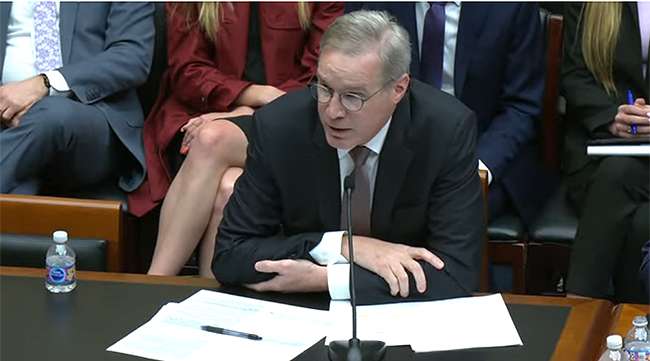Senior Reporter
ATA’s Spear Highlights Young Trucker Program at House Hearing

[Stay on top of transportation news: Get TTNews in your inbox.]
WASHINGTON — Enhancing recruitment and retention efforts across the trucking industry will benefit the connectivity of the country’s supply chain, American Trucking Associations President Chris Spear told a U.S. House panel March 28.
Emphasizing an industrywide shortage of drivers, Spear highlighted policies specific to trucking approved in 2021’s $1.2 trillion infrastructure law.
The Infrastructure Investment and Jobs Act, or IIJA, paved the way for an apprenticeship program to train truckers under 21 years old to operate commercial vehicles across state lines. The Safe Driver Apprenticeship Pilot program is designed to help individuals between the ages of 18 and 20 train for careers as professional truck drivers, and amplify the industry’s exposure to a younger demographic.
While Spear described the rollout of the Biden administration’s pilot programs as “frustratingly slow,” he noted its upside.
“Through this pilot program, the federal government will be able to collect data that proves what the states, the District of Columbia and the United States military already know — these individuals can be trained to operate safely in interstate commerce, just as they do in intrastate commerce and war zones,” Spear told the members of the Education and the Workforce Committee. “We are enthusiastic about the [Safe Driver Apprenticeship Pilot] and want it to be successful.”
Per data from ATA, the industry is short approximately 78,000 drivers, a slight decrease from the 2021 estimate. As Spear put it, “We’ve been dealing with the shortage of talent for a number of years — certainly predating COVID. It certainly got worse post-pandemic, [with] fewer people returning to work across all sectors of the economy, and trucking was certainly not isolated from that.”
National and state-level initiatives relative to employment classification also were addressed during the hearing. As Spear noted, ATA is pressing Congress and the Biden administration to avoid “upending the time-tested balance between employers and employees with schemes entirely engineered to remove personal freedoms. Such outcomes are anti-American, anti-worker and anti-choice, and collectively would be the result of unabashed pandering to special interests.”
He took specific aim at the federal Protecting the Right to Organize (PRO) Act, and its potential effects on the trucking workforce. The bill would primarily seek to revise definitions of an employee, supervisor and employer.
“Every day we’re moving milk, eggs, bread to vaccines,” Spear said. “If you want the things that you need, you’re going to need a driver. We’re already short 78,000. Now we’re going to exacerbate that with another 350,000 by making the requirements so vague that it literally makes the independent contractor — the 90-year-old model — irrelevant.”
Spear added, “This is about choice. Nobody is telling these people they have to go down this path. There are laws in place and enforcement to take care of any abuses that occur out there.”
Republicans on the committee also criticized the PRO Act as well as California’s AB 5 law from 2019, which installs a test to determine if an individual should be classified as a company’s employee.

Sova
Rep. Eric Burlison (R-Mo.) highlighted the background of commercial truck driver Dee Sova, an ATA America’s Road Team Captain, formerly based in California. Sova moved to Missouri due primarily to the AB 5 law, which is intended to reclassify owner-operators as carrier employees. Spear shared her story with the committee.
”She’s an independent contractor, African-American, mother, putting her kids through college. She understands what it takes to be successful. Not just as a mother, but as a businessperson,” he said. “And she left California simply because of the regulatory headwinds that were put on independent contractors.”
Rep. Kevin Kiley (R-Calif.), in agreement with his GOP colleagues, added, “I have spoken with many of these folks. I’m from California. And as a matter of fact, shortly after that law went into effect, we compiled a whole book of their stories about how they’ve been affected by this law.”
In February a group of House Democrats introduced a version of the PRO Act.
Want more news? Listen to today's daily briefing above or go here for more info
At the hearing, committee ranking member, Rep. Bobby Scott (D-Va.), told colleagues, “Unions are essential for building a strong middle class and improving the lives of our workers and families. The PRO Act will ensure that every worker can reap the benefits of a union, which means bigger paychecks, better benefits and safer workplaces.”
Meanwhile, House Committee Chairwoman Virginia Foxx (R-N.C.) pointed to her caucus’ focus on tackling economic pressure points: “House Republicans were given a mandate by the American people to offer an alternative vision for our economy.
“We will put forward solutions to reduce unnecessary regulations, control spending, offer more Americans opportunities for skills development, and remove impediments to hiring. Skills-based education is one pathway to prepare students for the job market,” said Foxx. “By increasing work-based learning opportunities and extending the Pell Grant to short-term, high-quality programs, we can help workers get the skills they need for lifelong success.”




